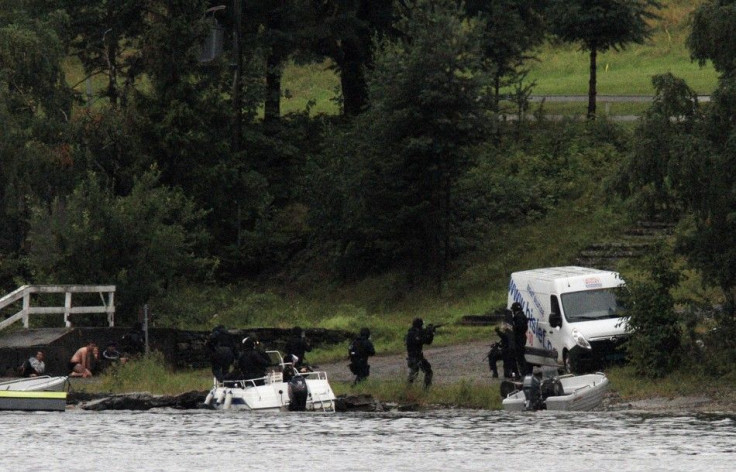Utoeya, Norway Attacks: Why Was the Police an Hour Late?

As Norway comes to terms with the worst massacre in the nation's modern history, it seems that the survivors from the shootings at Utoeya Island have criticized the authorities for not preventing the attacks and their slow response over the incident, reports Reuters.
The police claim that their response was deterred due to an apparent lack of resources and urgency. Just after detonating a bomb in Oslo, Anders Behring Breivik went on a shooting spree at a youth camp in Utoeya Island killing 68 people, mostly teenagers.
The police and the Emergency Rescue Team were already overwhelmed by the Oslo bombings and their response to the island massacre was beleaguered with problems like a boat so overloaded with officers it took on water and no special helicopters to fly the SWAT team to the shooting site, stated the report. During the hour it took the police to finally get on the island, Breivik mercilessly fired at the campers who hid under beds and bushes or climbed trees or jumped into the lake to save themselves.
The local police at the Nordre Buskerud district in which Utoeya is located first received reports of the shooting at 5:26 p.m. They notified Oslo four minutes later and after another eight minutes they formally requested backup. Fourteen minutes later the local police arrived at mainland shore and had to wait for another seventeen minutes for a boat to take them to the island, stated the Reuters report.
"We asked for help from the SWAT team in Oslo, which is specially trained to deal with armed situations. We did not know about the extent of the situation that was out there," North Buskerud police chief Sissel Hammer was quoted as saying by the Dagsavisen daily newspaper.
"But this was not about waiting; this was 17 minutes during which we prepared ourselves."
The campers meanwhile set off in boats to help survivors in the water some of them coming under fire from Breivik in the process, according to the report.
One camper alone rescued 40 to 50 terrified people.
Around 6:09 p.m. the Oslo police set off for the island on a boat brought from Hoenefoss. But even then they faced problems as the boat which was overloaded with officers and equipment started to sink. Moreover, the only helicopter available to the police was not equipped to transfer the Emergency Rescue Team to the island and had to get to the main shore by car. However, state broadcaster NRK got a helicopter in the sky above Utoeya and filmed the gunman before the police's arrival.
Breivik surrendered two minutes after the SWAT team arrived on the island at 6:25 p.m.
"Why didn't you come earlier?" survivors screamed when Norwegian police arrived at the scene, reports Reuters.
By then Breivik had already taken 68 lives which made him "a person that killed one person every minute. If the police had actually been there just half an hour earlier, then 30 young lives would have been saved," Anne Holt, Norway's former justice minister told the BBC.
However, police feel that they did whatever they could given the lack of resources and other setbacks. Hammer asked the victims for their understanding adding "Personnel need time to be equipped and armed as well as transported to the scene."
The twin attacks in Norway have certainly unsettled the nation's police force. Norway, internationally known for its low rates of violence and crime, is one of only three European nations lacking a fully armed police force. Law requires Norwegian police officers to get authorization from their chief to gain access to a firearm. Only beat police officers in patrol cars have immediate access to weapons, however, law requires that the weapon remain unloaded and locked in a box in the car unless authorization is given.
The recent attacks as well as the fact that violence is creeping up on the once peaceful Norwegian society has sparked off concerns on the efficacy of their police force to deal with such challenges.
© Copyright IBTimes 2024. All rights reserved.





















